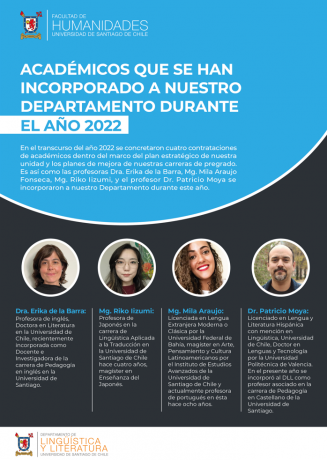New incorporations to our academic staff during 2022
Some insights from our recently incorporated academic staff regarding their participation and role in our department.
In 2022, four new academics were recruited within the framework of the new strategic plans for our unity and upgrading undergraduate programs. That’s how Dr. Erika de la Barra, Ms. Mila Araujo Fonseca, Ms. Riko Iizumi and Professor Dr. Patricio Moya joined our Department of Linguistics and Literature (DLL) at the Universidad de Santiago. During this interview, they told us about their personal experiences and plans within both the university and their private lives. They also had to reinvent their teaching methodologies because of the 2020-2021 context while being aware of the difficulties brought by the pandemic. In the words of Ms. Mila Araujo: “The teaching experience in a pandemic context made a variety of deep contradictions possible, especially regarding different levels of inequality undergone by the students”.
“Abundance and variety are harder to find in private universities”, said Erika de la Barra, new incorporation for the Pedagogy in English (PEI) program. Erika remarks the abundance, variety, and inclusion present in the Universidad de Santiago. All of these “essential” values are part of the unique mark highlighted by every academic that has joined our unit. In the same vein, Professor Mila Araujo indicates that the teachers’ perspective on the contingencies lived in our society is what gives our university the academic excellence and humanity that is known for.
In the interviews, the academics point out to strengthen said approach in the future by aiding in different disciplinary areas at the Department. In this regard, Professor Erika will coordinate the direction of English language in the PEI program to support and guide professors from those areas through the implementation of the syllabus in the classroom. In addition, Dr. De la Barra emphasizes her goal to integrate peacebuilding in the institution. This focus has been implemented previously in other universities where Dr. De la Barra has worked, facing the conflicts in the classroom through pacific language, since, like she indicates: “Society somehow has turned extremely violent”. In a similar way, Dr. Patricio Moya (Professor from the Pedagogy in Spanish program [PCA]) pretends to explore the mechanisms in both the classroom and research at the university to implement them in schools. For their part, Professor Mila Araujo (Portuguese Language) and Professor Riko Iizumi (Japanese Language) share their interest in future elaboration of didactic books for the lower language levels from the program of Applied Linguistics in Translation Studies, as there is a need of support for the students. Professor Mila reveals that those books will contemplate the cultural exchange between Portuguese-speaking countries and Chile, as well as Professor Riko with future Japanese workbooks
At the same time, they told us about their personal challenges related to the future in both private and working life. On the one hand, Professor Mila expresses interest to continue developing her master research work in a PhD program related to shedding light upon the importance of Portuguese as a foreign language in Chile, and establishing how they dialogue within their cultural diversity. On the other hand, Dr. Moya pretends to keep progressing on his line of research, which will delve into teaching practices of in-training Spanish teachers to help their students to develop their communicative competences. For her part, Professor Riko wishes to focus on publishing new workbooks with cultural topics from Chile and Japan. Lastly, Dr. de la Barra seeks to develop projects focused on pacific teaching in the classroom. She also said that —as a very personal goal— she wishes to run a 21km. marathon next year, since she thinks there’s a great sense of pleasure from playing sports and her current running record is 10km.
We congratulate each and everyt new academic staff that has committed to, in their own words, strive to promote the students’ professional development and keep carrying out their functions to work in the deficiencies in the Chilean educational system. Certainly, the new academic staff will bring a breath of fresh air to our Department. With a new perspective that will combine old and new to further improve higher education and make it more conscious, participative and inclusive.




